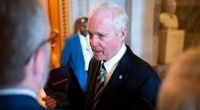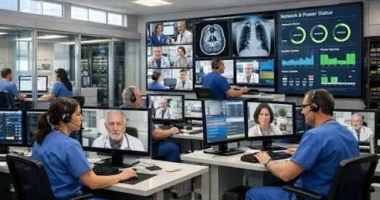Share this @internewscast.com
Millions more Americans should be screened for deadly cancer well before the current recommendations to catch the killer disease before it spreads beyond treatment, experts warn.
Dr Michael Raphael, who works with young cancer patients, told DailyMail.com he believes age limits should be dropped when it comes to screening for colon cancer, especially as more patients in their 20s, 30s and early 40s are being diagnosed with the disease.
Colon cancer is among the fastest growing cancers in young adults, particularly 20 to 29-year-olds — where cases are surging by 2.4 percent per year on average.
Because younger patients are often dismissed, their cancer is not found until it has metastasized throughout the body, making it far deadlier.
Currently, US guidelines recommend everyone get a colonoscopy at 45 — but some doctors now say anyone who wants a scan should be able to get one, regardless of age.
Dr Raphael said: ‘I strongly, strongly, strongly believe this screening age should be lowered to allow any patient at any age to get a scan for colon cancer.’
His views were echoed by Jessica Paulus, an ex-Harvard researcher now focused on colon cancer rates in young people, who also suggested loosening guidelines to allow those at higher risk to be screened earlier.
That includes younger adults who have more than one risk factor, such as a family history of the disease, who are obese, as well as people from minority ethnic groups or disadvantaged backgrounds, groups of people statistically more likely to be diagnosed late.

Marisa Peters, pictured above, was diagnosed with early-onset colon cancer at the age of 33 years. She is now a strong advocate for treatments for the disease and for spreading awareness of the cancer
This means more than to 44million more adults under 45 years old could be eligible for screening if this was adopted.
The United States Preventative Services Task Force (USPSTF), which sets colon cancer screening guidelines, has already lowered the recommended age for screening from 50 to 45 years in May 2021, saying this would have a ‘moderate’ benefit for patients.
Data shows about 34.5 percent of 45- to 49-year-olds got screened for colon cancer in 2022, a study found, up from 19.7 percent in 2021.
The US already has a lower colon cancer screening age than some other Western nations, including Canada — where it is set at 50 years — and England — which lowered the age from 60 to 50 years in 2021.
Doctors say people with symptoms of colon cancer or those who are concerned about the disease and are under 45 years old may still be able to get screened on their health insurance.
Insurance would consider screening tests for this group as diagnostic screenings – a test to investigate specific symptoms – rather than a preventative screening – a test done on someone without symptoms to catch a disease early.
Out-of-pocket, a colonoscopy costs between $1,250 and $4,800 — although this varies significantly by state.
Dr Raphael revealed he and his wife both first got screened for colon cancer at 35, despite having no family history of the disease. He recommended anyone who is concerned do the same.
The Ontario-based physician, from the Sunnybrook Research Institute, added: ‘Although I am from Canada, and the US has lower guidelines, I still think they should go further.’
Speaking at the American Society of Clinical Oncology’s annual conference in Chicago, Illinois, he gave a talk on how colon cancer rates were surging in the US.
Paulus said: ‘We have seen an “algorithm” be used already for non-small cell lung cancer screening to determine who should be screened when, based on risk factors. The same could be useful for colon cancer.’
She added: ‘Obesity could be one of the factors used to determine risk, but it would be better to take a multifactorial approach including other factors such as family history or ethnicity/race, although that can be controversial.’

Bailey Hutchins of Tennessee, pictured, died of colon cancer at just 26 years old
Non-small cell lung cancer is the most common type of lung cancer, behind 85 out of every 100 cases diagnosed on average.
The USPSTF screening guidelines for lung cancer say adults aged 50 to 80 years get screened if they currently or within the last 15 years smoked 20 packs of cigarettes or more per year.
Other doctors have also called for the screening age to be lowered, including Dr Aparna Parikh, a gastrointestinal cancer expert at Mass General Cancer Center.
She previously told the Harvard Gazette: ‘As an oncologist who sees largely young patients, my bias is to screen earlier.
‘Many of my patients are in their 20s and 30s. Expanding the screening eligible age may be a good space for stool- and blood-based screening and risk stratification to get the right people to colonoscopies efficiently.’
Colon cancer is generally screened for using a colonoscopy, where a flexible tube is inserted through the anus and into the colon. Patients are told not to eat any solid food for at least 24 hours beforehand.
Alternatives include stool-based testing, where the fecal matter is examined for specs of blood or changes in shape, or blood-based screenings, where the blood is tested for specific changes in DNA that may indicate the cancer.
At the conference, Paulus presented her team’s study that found half of colon cancer patients diagnosed before age 50 years are under 45 years old.
Her team analyzed data on 104,281 colon cancer patients diagnosed between 2000 and 2024, including 14,611 people who were diagnosed with the cancer before the age of 50 years.
She also found that patients diagnosed with colon cancer before age 50 were more likely to be obese (36 percent of the group compared to 31 percent among older adults).
And more likely to live in urban areas, and be from a Black, American Indian or Hispanic background.

Heather Candrilli (left) was diagnosed with stage 4 colon cancer last spring at 36 years old


Dr Michael Raphael called for the colon cancer screening age to be lowered, while Jessica Paulus suggested that people with risk factors for the disease may need to be screened earlier
The scientists concluded, ‘In one of the largest cohorts of patients with EO-CRC [early-onset colorectal cancer] to date, this study confirmed that EO-CRC is an emerging concern within the US community oncology setting, particularly regarding heightened disparities in race, ethnicity, and lifestyle factors.’
Dr Pamela Kunz, the director of the Center for Gastrointestinal Cancers at Yale, Connecticut, told DailyMail.com in an interview that she did not believe the screening age for colon cancer should be lowered.
‘At present, the best data we have suggests that starting screening from age 45 years has the greatest benefit,’ she said, ‘while those with a family history of the disease should start ten years younger than the age of diagnosis’.
‘There has not been great uptake of colon cancer screenings among people aged 55 to 45 years after the age was lowered.
‘There’s so much we don’t know too about why individuals develop the cancer – and whether it’s genetic, environmental, diet or another factor.’
Colon cancer cases are surging among under-50s in the US in an uptick that has stunned researchers, with adults born in the 1980s having double the risk of suffering from the cancer compared to their parents.
Among adults aged 25 to 29 years, colon cancer cancer rates have spiked 85 percent in two decades according to CDC data. AT the same time, over the last 30 years cases have dropped among over-50s by 30 percent.













